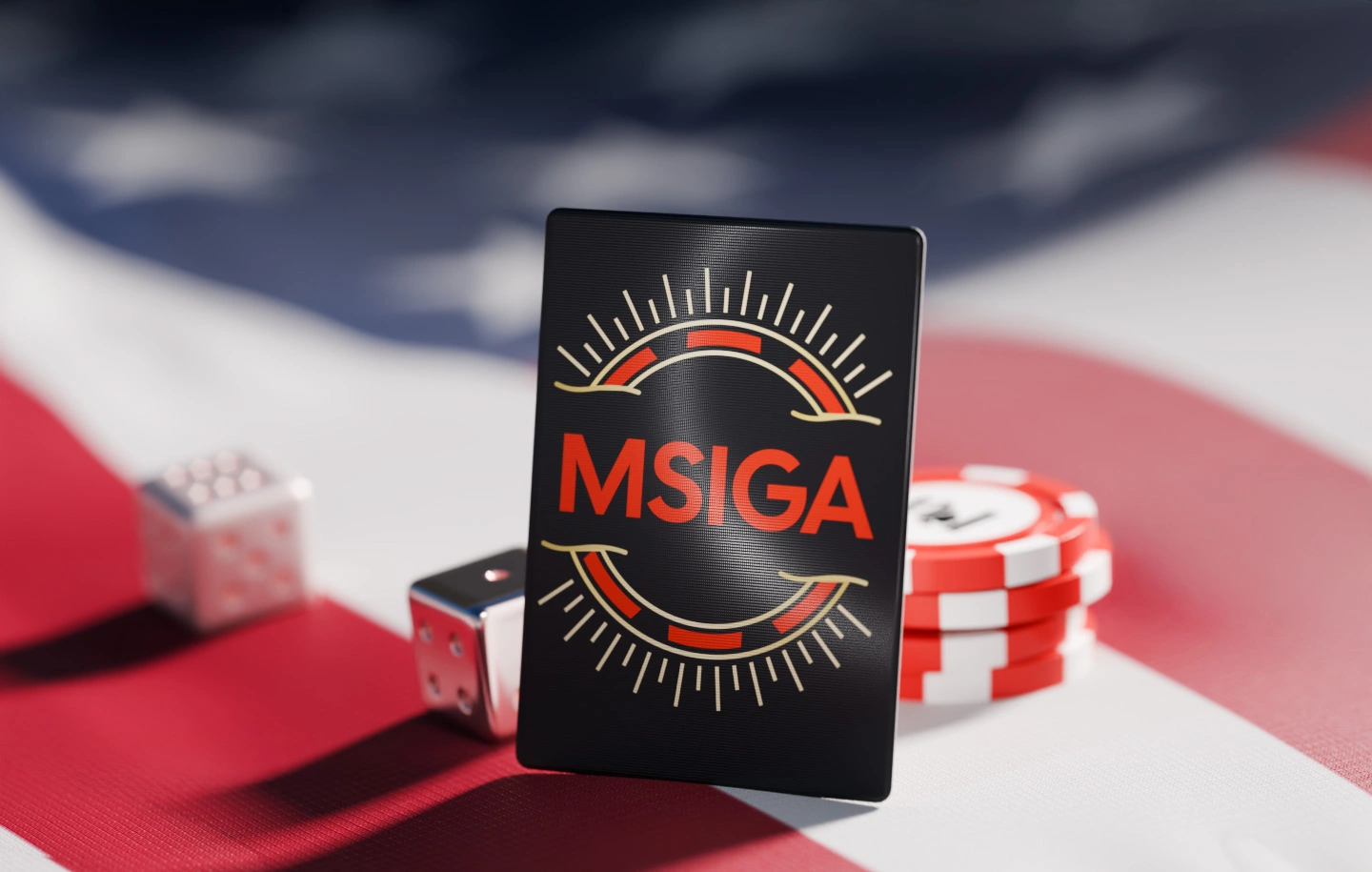What MSIGA Means for U.S. Poker in 2025

- Fact Checked by: PokerListings
- Last updated on: April 30, 2025 · 5 minutes to read
Poker players in the U.S. are finally getting what they’ve been asking for since Black Friday: bigger tournaments, busier tables, and multi-state action. And at the center of it all is a not-so-catchy acronym — MSIGA.
The Multi-State Internet Gaming Agreement, or MSIGA, isn’t new. But for the first time in years, it’s making waves again — and this time, it might actually stick.
With Pennsylvania officially joining the compact in April 2025 and operators like WSOP Online and BetMGM launching shared liquidity networks across state lines, MSIGA is no longer just a legal formality — it’s a functional framework that’s finally changing the online poker experience for players in a real, tangible way.
So what exactly is MSIGA? How did we get here? And why should players care now more than ever?
Let’s walk through it.
What MSIGA Actually Does — and Why Poker Needs It
At its core, MSIGA is a legal agreement between states that allows licensed poker sites to share player pools across borders. That’s it. But that small permission solves the biggest problem online poker has faced in the U.S. since 2011: fragmentation.
Since Black Friday, online poker has returned to the U.S. state by state, each with its own rules, sites, and borders. That meant limited liquidity — players in New Jersey couldn’t play with those in Michigan, tournaments struggled to hit guarantees, and cash games often sat empty. Poker’s lifeblood is its player pool. Without it, the game dries up.
MSIGA allows operators to connect those pools, provided they have the proper licenses and infrastructure in each participating state. And as more states come on board, the quality of games improves for everyone. More players means faster games, deeper tournaments, and more consistent traffic — whether you’re a low-stakes Sit & Go grinder or hunting high roller bracelets.
Why Shared Liquidity Is Such a Big Deal
Online poker needs people to work. That sounds obvious, but without a steady stream of active players, even the best-designed sites start to feel like ghost towns.
That’s where MSIGA comes in. It allows smaller states (like Delaware or West Virginia) to stay viable and gives bigger states (like Michigan and Pennsylvania) the power to host truly meaningful tournaments.
In a shared liquidity market:
- Tournaments have bigger prize pools.
- Sit & Gos fill faster.
- Cash game traffic runs around the clock.
- And there’s less incentive for players to head back to offshore sites.
The Growth of MSIGA (And Why 2025 Is the Tipping Point)
MSIGA got its start back in 2014 when Nevada and Delaware signed the first interstate poker compact. The impact at the time was modest — both states had small populations and only a couple of operators. But it was a start.
New Jersey joined in 2017, marking a key shift. Suddenly, the network included a nearly 9-million-person state with serious poker history. Still, progress was slow. Legal, logistical, and technological hurdles kept operators cautious — and many states sat on the sidelines.
That changed when Michigan joined in 2022, followed by West Virginia in 2023. And in April 2025, Pennsylvania finally signed on, immediately becoming the largest state in the compact and bringing an estimated 150,000 active online poker players with it.
Now, six states are part of MSIGA: Nevada, Delaware, New Jersey, Michigan, West Virginia, and Pennsylvania. And for the first time, multiple major operators are launching synchronized, multi-state networks.
WSOP Online, the only operator with a license in Nevada, has created the first-ever four-state player pool — linking PA, MI, NJ, and NV. BetMGM launched its tri-state network (PA, NJ, MI) on the same day, offering freerolls, guarantees, and promotions tailored to the new combined player base. For players, the difference is immediate. Waiting for a game is less common, prize pools are bigger, and competition is deeper. This isn’t just a policy update — it’s a turning point.
As of April 2025, six U.S. states have joined MSIGA:
- Nevada
- Delaware
- New Jersey
- Michigan
- West Virginia
- Pennsylvania (joined officially in April 2025)
That’s a combined population of roughly 38 million people. Not global scale — but for U.S.-regulated poker, it’s the biggest the game has been since Black Friday.
Operators, Expansion Plans, and What Comes Next
Not every site is caught up just yet. PokerStars, which already links Michigan and New Jersey, still operates Pennsylvania as a standalone market. But with SCOOP 2025 coming up in May and shared liquidity pressure rising, that could change soon.
BetRivers Poker is another wildcard. It’s currently only live in Pennsylvania but has signaled plans to expand into Michigan, New Jersey, Delaware, and West Virginia. If successful, BetRivers could become the first operator to build a five-state poker network, something the U.S. has never seen in a regulated space.
Meanwhile, BetMGM is eyeing Nevada. The company didn’t renew its waiver with the state gaming board in April 2025, which likely signals a move toward launching a full poker platform there later this year. If that happens, both WSOP and BetMGM will have a four-state footprint — setting the stage for some real competition at the national level.
On the legislative side, Connecticut and Rhode Island have legalized online gaming, including poker, but haven’t joined MSIGA yet or launched poker platforms. Still, with the success of Pennsylvania’s rollout, pressure may mount for other states to get involved—not just to join the fun, but to avoid being left behind.
Why This Actually Matters to Players (And Not Just Lawyers)
This isn’t just another round of regulation talk. If you play poker online in the U.S., MSIGA is the reason your Sit & Go filled in under 10 seconds, or why the Sunday tournament you love suddenly doubled its guarantee. It’s why a bracelet win online this summer will feel more legitimate — because the field is finally big enough to mean something again.
For over a decade, players have been stuck in state silos, watching international sites run laps around the U.S. ecosystem. That’s slowly changing. Thanks to MSIGA, the country finally has a working model for multi-state online poker that’s legal, secure, and growing.
Is this the return to the poker boom days? No, not yet. But for the first time in a long time, U.S. online poker doesn’t feel like it’s stuck. It feels like it’s moving.
And that’s something players should be paying attention to.
-
- 100% up to $2000
T&Cs Apply | Play Responsibly | GambleAware
18+ | Play Responsibly | T&C Apply
-
CoinPoker4.1
- 33% Weekly
- 150% up to 2000$
T&Cs Apply | Play Responsibly | GambleAware
+18 / T & C apply / Play responsible
-
Stake.US Poker4.3
- Rakeback 5%
- $55 Stake Cash + 260K Gold Coins
T&Cs Apply | Play Responsibly | GambleAware
18+ | Play Responsibly | T&C Apply
-
- 100% up to $1000
T&Cs Apply | Play Responsibly | GambleAware
T&Cs Apply | Play Responsibly | GambleAware
-
T&Cs Apply | Play Responsibly | GambleAware
18+ | T&Cs Apply | Play Responsibly | GambleAware



